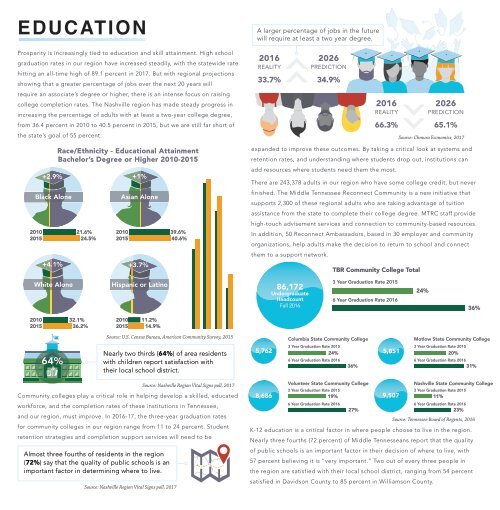VitalSigns-2017
You also want an ePaper? Increase the reach of your titles
YUMPU automatically turns print PDFs into web optimized ePapers that Google loves.
EDUCATION<br />
A larger percentage of jobs in the future<br />
will require at least a two year degree.<br />
Prosperity is increasingly tied to education and skill attainment. High school<br />
graduation rates in our region have increased steadily, with the statewide rate<br />
hitting an all-time high of 89.1 percent in <strong>2017</strong>. But with regional projections<br />
showing that a greater percentage of jobs over the next 20 years will<br />
require an associate’s degree or higher, there is an intense focus on raising<br />
college completion rates. The Nashville region has made steady progress in<br />
increasing the percentage of adults with at least a two-year college degree,<br />
from 36.4 percent in 2010 to 40.5 percent in 2015, but we are still far short of<br />
the state’s goal of 55 percent.<br />
2016<br />
REALITY<br />
2026<br />
PREDICTION<br />
33.7% 34.9%<br />
2016<br />
REALITY<br />
2026<br />
PREDICTION<br />
66.3% 65.1%<br />
Source: Chmura Economics, <strong>2017</strong><br />
Race/Ethnicity - Educational Attainment<br />
Bachelor’s Degree or Higher 2010-2015<br />
expanded to improve these outcomes. By taking a critical look at systems and<br />
retention rates, and understanding where students drop out, institutions can<br />
add resources where students need them the most.<br />
There are 243,378 adults in our region who have some college credit, but never<br />
finished. The Middle Tennessee Reconnect Community is a new initiative that<br />
supports 2,300 of these regional adults who are taking advantage of tuition<br />
assistance from the state to complete their college degree. MTRC staff provide<br />
high-touch advisement services and connection to community-based resources.<br />
In addition, 50 Reconnect Ambassadors, based in 30 employer and community<br />
organizations, help adults make the decision to return to school and connect<br />
them to a support network.<br />
Source: U.S. Census Bureau, American Community Survey, 2015<br />
Nearly two thirds (64%) of area residents<br />
with children report satisfaction with<br />
their local school district.<br />
Source: Nashville Region Vital Signs poll, <strong>2017</strong><br />
Community colleges play a critical role in helping develop a skilled, educated<br />
workforce, and the completion rates of these institutions in Tennessee,<br />
and our region, must improve. In 2016-17, the three-year graduation rates<br />
for community colleges in our region range from 11 to 24 percent. Student<br />
retention strategies and completion support services will need to be<br />
Almost three fourths of residents in the region<br />
(72%) say that the quality of public schools is an<br />
important factor in determining where to live.<br />
Source: Nashville Region Vital Signs poll, <strong>2017</strong><br />
Source: Tennessee Board of Regents, 2016<br />
K-12 education is a critical factor in where people choose to live in the region.<br />
Nearly three fourths (72 percent) of Middle Tennesseans report that the quality<br />
of public schools is an important factor in their decision of where to live, with<br />
57 percent believing it is “very important.” Two out of every three people in<br />
the region are satisfied with their local school district, ranging from 54 percent<br />
satisfied in Davidson County to 85 percent in Williamson County.



